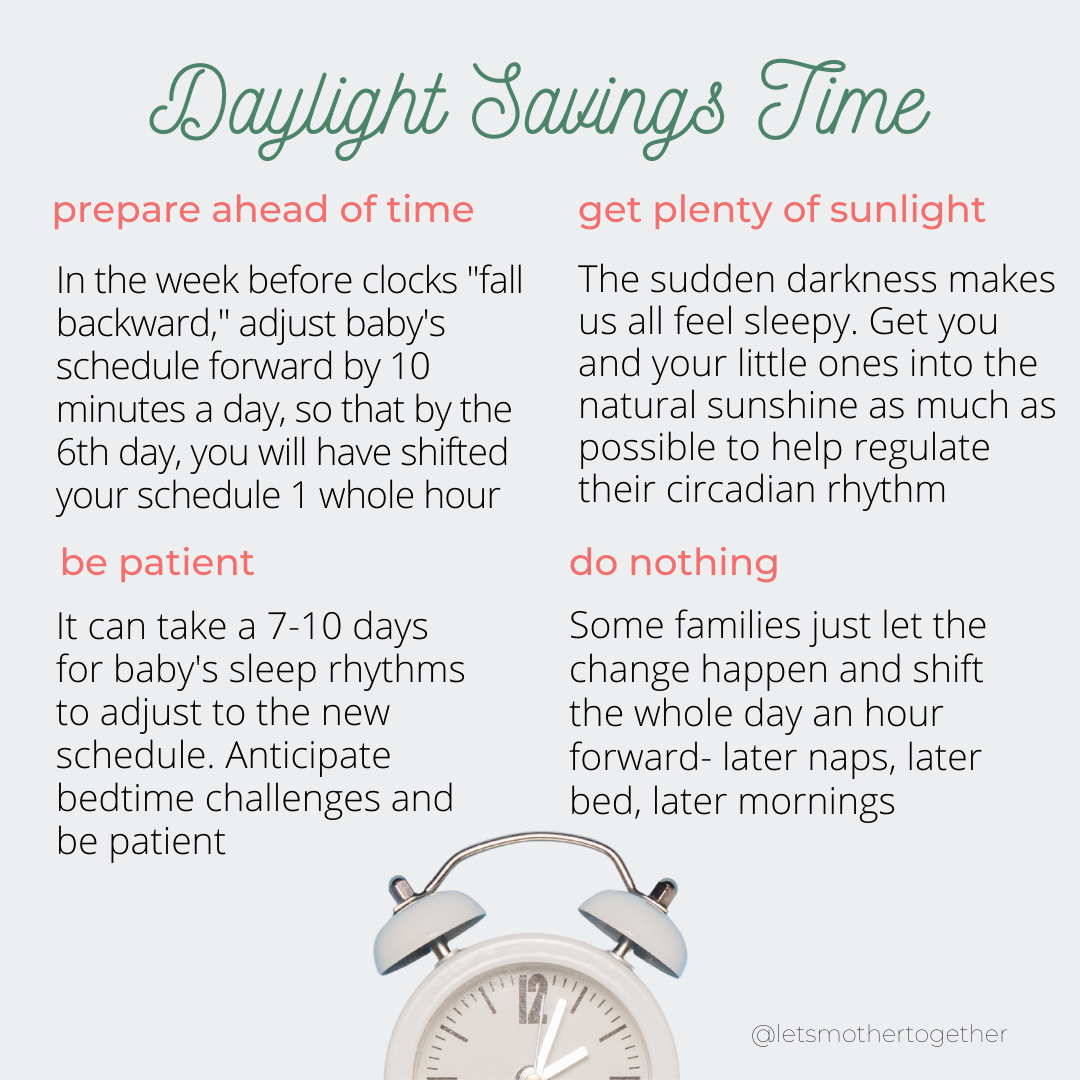How to Handle the End of Daylight Saving Time
Can you believe that we are approaching the end of Daylight Savings Time in 2020?
Do you remember before you had children and the end of the Daylight Savings meant that you got a glorious extra hour of sleep? Those were good times. Simpler times.
So, the bad news is that I can’t make your child sleep an extra hour. The good news is that I can help you manage the time change and perhaps struggle a little less as the clocks “fall back.”
1) Prepare in advance
Daylight Savings ends on November 1, 2020, which means you will want to start shifting your little one’s schedule a little at a time beginning at least one week in advance.
So, next weekend, begin by moving naps about 10 minutes later each day, ending their nap 10 minutes later, and moving bedtime 10 minutes later as well. The whole day should shift together.
Hopefully, this will mean your baby wakes about 10 minutes later in the morning. Then, shift the day another ten minutes. And another. Until your entire day is an hour later just in time for the clocks to “fall backwards.”
This is not fool-proof and some babies like to watch us squirm (Okay, not seriously, mom-shamers. I know babies are incapable of manipulating parents. Lay off).
Which leads me to…
2) Gradually adjust after the fact
Maybe you forgot about the time chage.
Now what do you do with a baby who is waking at the crack of dawn?
Do exactly the same thing I suggest above:
Begin shifting their schedule forward by about 10 minutes at a time. So, delay the start of their nap by 10 minutes and delay bedtime by 10 minutes, and we hope they will wake about 10 minutes later the next day.
Continue adding 10 minutes to the day every few days until you are back to your normal morning wake time, normal nap, and normal bedtime.
3) Cold turkey?
So, maybe you’re a little more of a “rip the bandaid off” kind of parent. I hear you.
The kids were up super early and now you need to set the day straight. Here is how:
Base nap on your DESIRED WAKE TIME.
Example: Baby woke at 5 but you want him up at 6:30. Don’t put him down for naps early! This will simply reinforce the early morning. Keep baby awake until their normal nap time, and after a few days to a week, you should be back on schedule.
For some kids, this means a few days of shorter naps while they adjust to the new schedule, but press on. If you put them down for an early nap, you’ll end up with an early bedtime, and another early morning. You have to break the cycle and the first wake time of the day is the easiest place to do this.
4) Blackout curtains are your friend
The clocks fall backwards each November, which means the sun will rise in the 5 o’clock hour for some of us! If you don’t want your baby “up with the sun” literally, make sure their room is nice and dark!
5) Get plenty of sunshine
When the clocks change, our bodies don’t quite understand and we tend to feel extremely tired when the sun begins to set. It takes a few weeks to settle into the new normal, but you can help your children and yourself by getting out into as much natural sunlight as possible. This is especially helpful in the days immediately following the clocks changing.
6) Embrace the suck
This is a super fun and useful Army phrase that I long ago realized applies to all sorts of unpleasant situations outside of our military life.
Look, none of us (parents, that is. Remember before kids when this night meant extra sleep?!) like the end of Daylight Saving. Your cherubs rising at the crack of dawn is no one’s idea of fun.
In our house, we have opted to celebrate the day. It is awful. It is early. Nobody got an extra hour of sleep. So, we load the boys up in their pajamas and take them out for breakfast.
COVID-related bonus: if you have concerns about social distancing, there is a very good chance that yours will be the only family at IHOP at 6am, so pack the Lysol wipes and enjoy some pancakes. If your family is taking extra precautions, wake up and make a big family breakfast at home this year. Either way, flip the script and make it an annual family memory rather than just a stressful, sleepy Sunday.
I want to close this by encouraging you not to stress. Yes, the end of DST is a pain, and yes it may mean early mornings for a little bit. I offer concrete tips but I hope to also bring a little levity and laughter to the struggle and don’t want it to be a source of anxiety. Prepare, but then take a big deep breath if the day arrives and your littles are up early. If you persist with their schedule for a week or two and don’t see any improvement, reach out and we can sort through the problem together!





